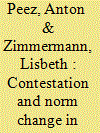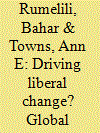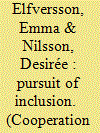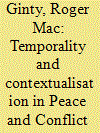|
|
|
Sort Order |
|
|
|
Items / Page
|
|
|
|
|
|
|
| Srl | Item |
| 1 |
ID:
185245


|
|
|
|
|
| Summary/Abstract |
Elephants and whales took center stage in the environmental movements of the 1980s. As flagship species, they were the poster children of global initiatives: international ivory trading and commercial whaling were banned in the 1980s in the context of the Convention on International Trade in Endangered Species of Wild Fauna and Flora (CITES) and the International Whaling Commission (IWC), respectively. While the conservation of both species is contested, we observe a change of existing norms in one case but not in the other: A moratorium on commercial whaling remains in place. Meanwhile, a limited shift to sustainable use regarding ivory was passed in 1997/2000. We ask why norm change occurred in one case but not the other, given their similarities. We argue that the difference can be explained by the perceived legitimacy of the claims of norm challengers using arguments of “affectedness” and the breadth of issues covered by CITES. In contrast, other factors commonly discussed in norms research do not explain this puzzle: the relative power and strategies of norm advocates and challengers, and the degree of legalization. This shows the interplay of discursive aspects and concrete institutional opportunities for norm change, even in the face of otherwise inopportune conditions.
|
|
|
|
|
|
|
|
|
|
|
|
|
|
|
|
| 2 |
ID:
185241


|
|
|
|
|
| Summary/Abstract |
The existing literature on Global Performance Indices (GPIs) is mostly dominated by unit-level analyses focused on specifying the relevant properties of the GPIs and the motivations of state actors in being influenced by GPIs. This article advances a systemic approach, which conceives of GPIs as collectively constituting a system of normative stratification in International Relations (IR). By bringing together the literature on GPIs with the relevant IR literatures on international hierarchies and status-seeking, we identify the structural attributes of the GPI-based system of stratification, how these structural attributes shape the distribution of normative status positions among states, and how this distribution is likely to condition the pursuit of status by states. In particular, we argue that the disaggregated structure and relative ranking of states, respectively, generate status ambiguity and immobility, which both dissuade states from seeking higher moral status through improving their scores in the existing indices. We illustrate the patterns of status ambiguity and immobility present in the GPI-based system of stratification through an empirical analysis of the scores and rank positions of the United States, European Union (EU) members, and “rising powers” in five different indices in the past decade.
|
|
|
|
|
|
|
|
|
|
|
|
|
|
|
|
| 3 |
ID:
185242


|
|
|
|
|
| Summary/Abstract |
Why are some peace processes in communal conflicts more inclusive of civil society actors than others? Inclusion of civil society actors, such as churches and religious leaders, women’s organizations, or youth groups, is seen as important for normative reasons, and studies also suggest that civil society inclusion can improve the prospects for durable peace. Yet, we have a very limited understanding of why we observe inclusion in some communal conflicts but not others. We address this gap by theorizing about various forms of civil society inclusion in local peace processes, and examining to what extent involvement by different types of third-party actors—governments, inter-governmental organizations (IGOs), and non-governmental organizations (NGOs)—may contribute to inclusion. Empirically, we draw on a combination of cross-case and in-depth data covering peace negotiations in communal conflicts in Kenya. The findings show that civil society was less frequently included as facilitators when the government was involved as a third party, while inclusion in the form of direct participation of civil society in negotiations, or via involvement in the implementation phase, was equally common across different types of third-party actors. Our study thus provides important new insights regarding how inclusion plays out in communal conflicts.
|
|
|
|
|
|
|
|
|
|
|
|
|
|
|
|
| 4 |
ID:
185240


|
|
|
|
|
| Summary/Abstract |
This article offers a critical outlook on existing debates on state recognition and proposes future research directions. It argues that existing knowledge on state recognition and the dominant discourses, norms and practices needs to be problematized and freed from power-driven, conservative, positivist and legal interpretations and reoriented in new directions in order to generate more critical, contextual and emancipatory knowledge. The article proposes two major areas for future research on state recognition, which should: (a) expose the politics of knowledge, and positionality, and seek epistemic justice and decolonization of state recognition studies; and (b) study more thoroughly recognitionality techniques encompassing diplomatic discourses, performances and entangled agencies. Accordingly, this article seeks to promote a long overdue debate on the need for re-visioning state recognition in world politics.
|
|
|
|
|
|
|
|
|
|
|
|
|
|
|
|
| 5 |
ID:
185243


|
|
|
|
|
| Summary/Abstract |
This article contributes to debates on appropriate levels of analysis, temporality, and the utility of fieldwork in relation to Peace and Conflict Studies (PCS), and International Relations more generally. It observes a recentism or privileging of the recent past in our studies and a consequent overlooking of the longer term. As a corrective, the article investigates the extent to which wartime memoirs and personal diaries (specifically from World War I and World War II) can help inform the study of contemporary peace and conflict. In essence, the article is a reflection on the epistemologies and methodologies employed by PCS and an investigation of the need for greater contextualisation.
|
|
|
|
|
|
|
|
|
|
|
|
|
|
|
|
| 6 |
ID:
185244


|
|
|
|
|
| Summary/Abstract |
Avoidance of civilian casualties increasingly affects the political calculus of legitimacy in armed conflict. “Collateral damage” is a problem that can be managed through the material production of precision, but it is also the case that precision is a problem managed through the cultural production of collateral damage. Bearing decisively on popular perceptions of ethical conduct in recourse to political violence, childhood is an important site of meaning-making in this process. In pop culture, news dispatches, and social media, children, as quintessential innocents, figure prominently where the dire human consequences of imprecision are depicted. Children thus affect the practical “precision” of even the most advanced weapons, perhaps precluding a strike for their presence, potentially coloring it with their corpses. But who count as children, how, when, where, and why are not at all settled questions. Drawing insights from what the 2015 film, Eye in the Sky, reveals about a key social technology of governance we have already internalized, I explore how childhood is itself a terrain of engagement in the (un)making of precision.
|
|
|
|
|
|
|
|
|
|
|
|
|
|
|
|
|
|
|
|
|